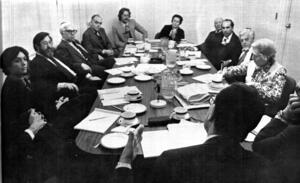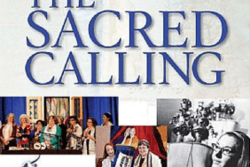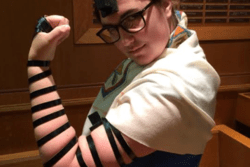The One Personal Question You SHOULD Ask a Rabbinical Candidate in an Interview
Members of the Commission on the Ordination of Women as Rabbis listen to Chancellor Cohen (back to camera) at one of the early meetings.
From left to right: Francine Klagsbrun, Fishel A. Pearlmutter, Haim Z. Dimitrovsky, Norman Redlich, Gordon Tucker, Rivka Harris, Wilfred Shuchat, Elijah J. Schochet, Victor Goodhill, Marian Siner Gordon and Seymour Siegel. Hidden from the camera were the two other members, Milton Himmelfarb and Harry Plotkin.
From the Jewish Theological Seminary Chancellor's Report 1977-1979. Courtesy of the Ratner Center for the Study of Conservative Judaism.
If you want to ask your (future) rabbi a personal question, it should be: “How can we best support you?”
A few years ago, I wrote a blog post comparing rabbinical placement to dating. It was meant to be lighthearted advice for my colleagues as they searched for “the one”: a congregation that would nurture and challenge them during the next phase of their career. Now, as some of my new colleagues enter the job market for the first time, I have some advice for the search committees.
My colleagues and I all have questions we don’t like to be asked, some of which are even considered illegal, but, nonetheless, they find their way into the conversation. While it is technically off-limits to ask a candidate about their marital status, sexual orientation, or childbearing plans, I’ve never interviewed for a pulpit position where it wasn’t brought up, directly or indirectly, or later discussed with my references. And I’ve never been in an interview where that question would have been comfortable for me to answer. It’s one thing to discuss your spouse and children if you have them; it is quite another to talk to a potential employer about your dating life. Once the personal question is on the table, there’s no way to not answer it without sounding rude. So I answer quickly and try to redirect.
Congregations can be comically persistent on this topic. One senior rabbi had his wife pump me for information while he was in the restroom. Another offered advice based on what he would say, “If you were my daughter…,” then joked about setting me up with his son. Once, after I’d answered several questions aimed at discussing my dating status, the interviewer posed a scenario: Suppose I moved to their beachfront community, met the love of my life while sunbathing, and married him. “What if he gets transferred to Chicago? What would you do then?”
Lest one think the grass is greener if one is married, my colleagues tell me that there are unsettling questions for all demographics. Married women are asked when they plan to have children, and about their childcare plans. A male colleague was met with concerns about whether his wife would be able to find meaningful work in their smaller community. While I don’t love this line of questioning, I understand why we always end up on this topic. Rabbis are not hourly employees. Congregations are hoping we will be their spiritual leader for the next few decades. They want to know who we are, what we’ll need, and whether we’ll stay. It’s reassuring to imagine one’s rabbi putting down roots and raising children in the community.
It’s possible that the rabbi being interviewed is pondering similar questions before moving to a new place: Can my partner find work here? Will my children thrive here? Would my elderly parents move here? Could I date here?
That doesn’t mean that rabbinical candidates want to air those concerns with the search committee, sliding their answers between responses to “What’s your leadership style?” and “What’s your vision for the Jewish future?” But while we can tell search committees what NOT to say, we haven’t given them much advice on what to ask instead. So here are my suggestions:
As far as figuring out a candidate’s status, a simple, “Tell us about your family” or “What do you do when you're not at the synagogue?” will reveal whether a person is married or has children (In my experience, people with children tend to talk about them).
But my favorite “personal question” I have encountered was when, during a recent interview, the committee chair asked, “How can we support you in your writing?”
This question acknowledged and affirmed that I had interests outside the synagogue, and that the community saw these interests as an asset and wanted me to continue them. It also allowed me to guide the conversation myself, instead of the more accusatory, “How are you going to balance x and y?” which can put the candidate on the defensive.
The question “How can we support you?” can be applied to many aspects of a candidate’s life, or left open-ended, so that a rabbi can explain what s/he needs to be successful: whether that is time to exercise, regular dinners with one’s family, a week at a writing retreat, or the occasional paintball tournament.
When a search committee asked me, “How can we best support you?” I knew that they cared about me as a whole person, with interests and commitments beyond my rabbinate.
That is one of the reasons I decided to become their rabbi.







